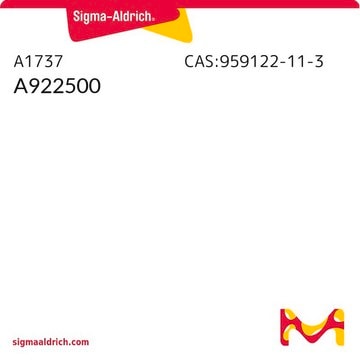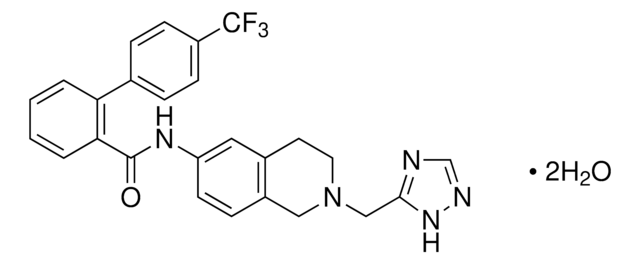SML0539
T863
≥98% (HPLC)
Synonym(s):
2-((1,4-trans)-4-(4-(4-Amino-7,7-dimethyl-7H-pyrimido[4,5-b][1,4]oxazin-6-yl)- phenyl)cyclohexyl)acetic acid, T-863, trans-4-[4-(4-Amino-7,7-dimethyl-7H-pyrimido[4,5-b][1,4]oxazin-6-yl)phenyl]-cyclohexaneacetic acid
About This Item
Recommended Products
Assay
≥98% (HPLC)
form
powder
color
white to beige
solubility
DMSO: 15 mg/mL (clear solution)
storage temp.
2-8°C
SMILES string
CC1(C)Oc2ncnc(N)c2N=C1c3ccc(cc3)[C@@H]4CC[C@H](CC4)CC(O)=O
InChI
1S/C22H26N4O3/c1-22(2)19(26-18-20(23)24-12-25-21(18)29-22)16-9-7-15(8-10-16)14-5-3-13(4-6-14)11-17(27)28/h7-10,12-14H,3-6,11H2,1-2H3,(H,27,28)(H2,23,24,25)/t13-,14-
InChI key
FUIYMYNYUHVDPT-HDJSIYSDSA-N
Application
- to provide the opportunity to precisely control the DGAT inhibition
- to treat mouse embryonic fibroblasts (MEFs) to analyse lipid droplet biogenesis
- to specifically block neutral lipid synthesis and lipid droplet formation in HT-1080 cells
- to block lipid droplet (LD) formation
Biochem/physiol Actions
Storage Class Code
11 - Combustible Solids
WGK
WGK 3
Flash Point(F)
Not applicable
Flash Point(C)
Not applicable
Certificates of Analysis (COA)
Search for Certificates of Analysis (COA) by entering the products Lot/Batch Number. Lot and Batch Numbers can be found on a product’s label following the words ‘Lot’ or ‘Batch’.
Already Own This Product?
Find documentation for the products that you have recently purchased in the Document Library.
Our team of scientists has experience in all areas of research including Life Science, Material Science, Chemical Synthesis, Chromatography, Analytical and many others.
Contact Technical Service








